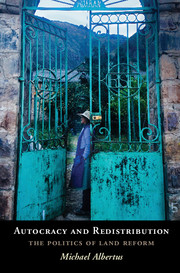Book contents
- Frontmatter
- Contents
- List of Tables
- List of Figures
- Acknowledgments
- 1 Introduction
- 2 Actors, Interests, and the Origins of Elite Splits
- 3 A Theory of Land Reform
- 4 Measuring Land Reform
- 5 A Cross-National Analysis of Land Reform in Latin America
- 6 Elite Splits and Redistribution under Autocracy: Peru's “Revolution from Above”
- 7 Land Reform Transformed to Redistribution: Venezuela's Punto Fijo Democracy and Chávez's Bolivarian Revolution
- 8 Latin America in Comparative Perspective
- 9 Conclusion
- References
- Index
- Other Books in the Series
1 - Introduction
Published online by Cambridge University Press: 05 October 2015
- Frontmatter
- Contents
- List of Tables
- List of Figures
- Acknowledgments
- 1 Introduction
- 2 Actors, Interests, and the Origins of Elite Splits
- 3 A Theory of Land Reform
- 4 Measuring Land Reform
- 5 A Cross-National Analysis of Land Reform in Latin America
- 6 Elite Splits and Redistribution under Autocracy: Peru's “Revolution from Above”
- 7 Land Reform Transformed to Redistribution: Venezuela's Punto Fijo Democracy and Chávez's Bolivarian Revolution
- 8 Latin America in Comparative Perspective
- 9 Conclusion
- References
- Index
- Other Books in the Series
Summary
What are the political conditions under which land reform occurs? When is land reform redistributive, and what political purposes does it serve? Who are the chief beneficiaries of reform? And what place, if any, does land reform have in today's world?
Land reform dates back at least to the time of Solon and Pisistratus in sixth-century BC Greece. Distributional questions related to land use and ownership were at the heart of the French Revolution, the emancipation of the serfs in Russia, and countless long-standing social movements in the developing world. And land reform continues in the present day in countries such as Brazil, the Philippines, South Africa, and Venezuela. US President John F. Kennedy encapsulated the imperative of land reform in the Americas when he announced the 1961 Alliance for Progress, highlighting the need for countries to “improve the productivity and use of their land, wipe out disease, attack archaic tax and land tenure structures, provide educational opportunities, and offer a broad range of projects designed to make the benefits of increasing abundance available to all.”
The answers that I provide to these important questions depart from much of the common wisdom about the rural sector that political scientists, economists, and sociologists hold dear. First and foremost is the observation that the most redistributive variety of land reform occurs under autocratic rule, not under democracy. Indeed, the spread of democracy has undermined land redistribution and left many disregarded rural populations cast adrift. This implies a second novel observation: in spite of the conclusions of influential scholars such as Barrington Moore and Alexander Gerschenkron, democracy has rarely been threatening to landowners. Indeed, democracy has not infrequently been a friend and savior of large landowners. Although democracy does not forestall all types of land reform, it tables land redistribution – the greatest threat to landed elites. Third, the focus on popular mobilization and the perception that mobilization drives redistribution is at least partly misplaced. Intra-elite conflict and institutional constraints to rule largely determine where and when redistributive land reform occurs. Popular mobilization only rarely yields land redistribution directly; much more frequently, it directs the scope and targeting of redistribution once an opening for redistribution has been created.
- Type
- Chapter
- Information
- Autocracy and RedistributionThe Politics of Land Reform, pp. 1 - 25Publisher: Cambridge University PressPrint publication year: 2015



